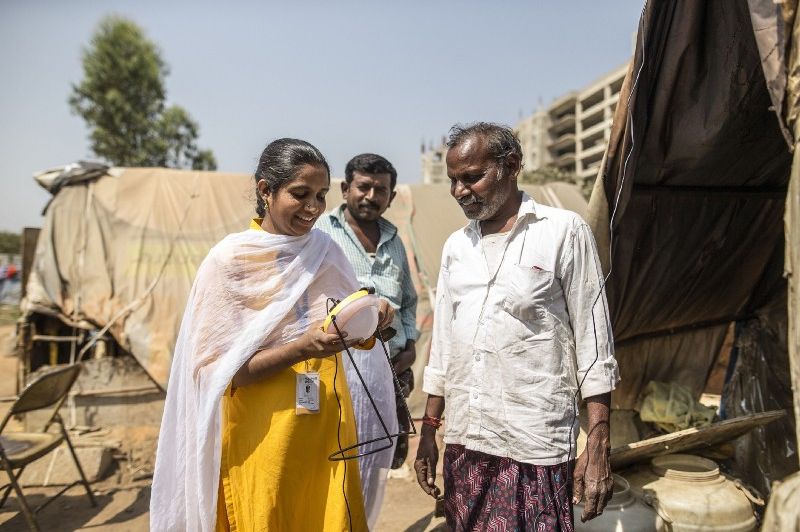Off-grid solar leader Greenlight Planet directly manages 2,000 sales agents in India, with its distributors employing another 10,000. Here is the story of one woman and the impact of solar on her life.
It was a Saturday evening and Amreen was getting ready for tomorrow’s work. Sunday would be the most important day in her new job as a Pollinate Energy sales agent. She put one more product into her faded maroon backpack, already heavy with four other boxes, invoice forms and a water bottle. Suddenly the power went out and she was standing in darkness.
Losing electricity wasn’t unusual. Her neighborhood in the southern Indian city of Bangalore experienced them fairly regularly. But always before someone else had been in the house — her husband, her sons or another member of their large joint family. This time the 32-year-old was alone and she was afraid.
Amreen reached into her backpack and opened one of the boxes. After two weeks of sales training, this was the first day she took the products home. She touched the switch and the warm glow of the light eased her fears. “In the dark, even someone with sight is blind,” Amreen said. “For the first time, I realized how much this will help people.”
It was her own experience of not having power which connected Amreen (who goes by one name) to the communities where she works — places that are completely off the grid and have no electricity or water services. She sells a range of solar-powered lights to families who would have been left in the darkness once night falls. The lights allow children to study, mothers to cook safely at night and help tailors and shopkeepers to work longer hours and earn more. The lights are also a healthy alternative to burning kerosene which has adverse effects after long-term exposure.
For India’s rural poor, especially women, these clean energy jobs, which are expected to total 330,000 by 2022 for solar and wind, can offer a lucrative alternative to subsistence farming.
Greenlight Planet manufactures low-cost “solar lanterns” under the Sun King brand and they are now used every day by more than 28 million people in 60 countries. The most basic product is a single solar lamp. Others provide light and USB charging for mobile phones, and there’s even a combination with a radio. The company partners with a wide range of distributors such as Pollinate Energy to help their products reach the most underserved populations.
The market is immense: over 1 billion people worldwide live off a reliable electric grid.
In the Doddanekkundi area of Bangalore, behind a gleaming mall and a field that doubles as bus parking and informal cricket grounds, hundreds of makeshift homes with blue tarp roofs form a community for the farmers turned road laborers and domestic help who migrated from Raichur, a village nearly 300 miles north.
Many of the homes have a slim, rectangular solar panel affixed to the roof. A thin wire connects this recharging station to the light hanging inside from the ceiling, which is several times brighter than a kerosene lamp. Amreen sells an average of 10 Sun King products here every month. Buyers have a choice to purchase at full price or put a deposit and pay in weekly installments through Greenlight Planet’s installment payment offering, EasyBuy. The most popular product costs USD $49.99 / INR 2399. This renewable energy sources works out much cheaper than the money spent every few days to stock up on the hazardous kerosene.
Amreen’s customers weren’t immediately queuing up for the products. She had to convince them not only of the products’ durability and usefulness but also provide a two-year guarantee. Key to her success was gaining the trust of David (who also goes by one name), one of the first to buy a light who then told other residents.
David now has two lights in his home. One hangs above the sleeping area in the back room. The other suspends over a cooking area. And when he returns home for a visit at Christmas, David takes one of them along. His home village often has power cuts.
The light allowed David to add another income to the family. He runs a small cafe and sells fried snacks and tea. “If something falls into the oil, I can’t see it unless I have the light,” David joked.
He also feels the light has given him a few intangible benefits as well. Not only do his neighbors come to buy an evening pakora or have a cup of tea, but they often chat, the area lit up and inviting them to stay a little bit longer.
